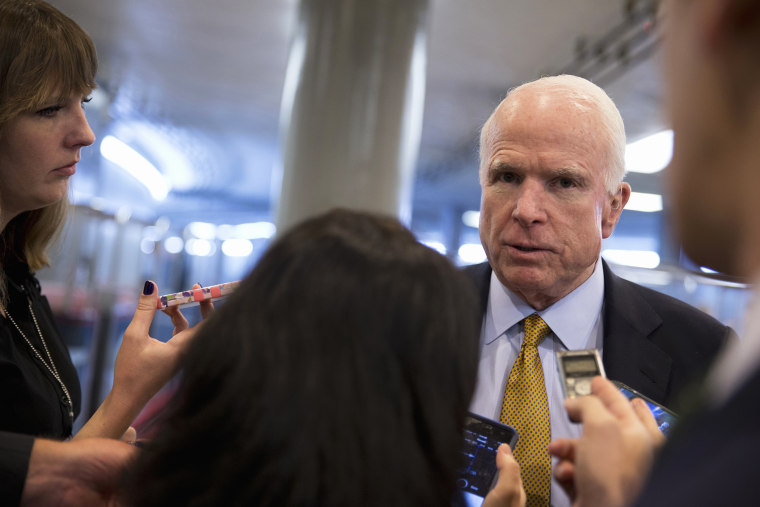Sen. John McCain (R-Ariz.), only recently having been diagnosed with brain cancer, delivered dramatic remarks on the Senate floor in July, lamenting what has become of contemporary politics and the legislative process. CNN called it "a Washington moment for the ages."
The same day, Roll Call told readers, "Years from now, when the history of the modern Congress is written, John McCain's address to the Senate on July 25, 2017, is likely to stand among the defining summations of the era."
As we discussed at the time, the Arizona Republican's remarks were certainly compelling. He made a powerful case for a more constructive and more deliberative legislative process. McCain extolled the virtues of "regular order," substantive hearings, and bipartisan deliberations.
Two days later, he killed his party's far-right health care overhaul, urging Republicans to do better.
With this in mind, many hoped McCain, with his legacy very much on his mind, would stick to those same principles as his GOP brethren took steps to ram through a regressive tax plan -- without the benefits of regular order, substantive hearings, and bipartisan deliberations. Those observers were disappointed to discover today that McCain's commitment to those principles was fleeting. His statement this morning read in part:
"After careful thought and consideration, I have decided to support the Senate tax reform bill. I believe this legislation, though far from perfect, would enhance American competitiveness, boost the economy, and provide long overdue tax relief for middle class families. "For too long, hardworking people in Arizona and around the country have not seen a raise in their paychecks. This bill would directly benefit all Americans, allowing them to keep a higher percentage of what they earn."
Substantively, the senator's position is plainly bizarre. To describe a bill that would raise taxes on millions of middle-class families as "tax relief" for the middle class is to willfully ignore what we already know about the legislation.
The same statement said he's "pleased that this important bill was considered through the normal legislative processes." I know McCain knows better: his party has taken two weeks to rush through massive legislation without so much as a substantive committee hearing. The final text of the legislation the senator just endorsed hasn't even been released yet -- and the vote is likely to happen tomorrow. There's literally nothing "normal" about any of this.
Or put another way, McCain is on record saying he wanted a tax plan that was bipartisan, the result of a careful and deliberative process filled with compromises, and wasn't tilted to favor the wealthiest of the wealthy. This bill is therefore the opposite of what McCain hoped to see, and he's voting for it anyway.
Earlier this week, the New York Times' David Leonhardt described the Republican tax plan as "a test" of McCain's principles. Today, the veteran lawmaker flunked that test.
